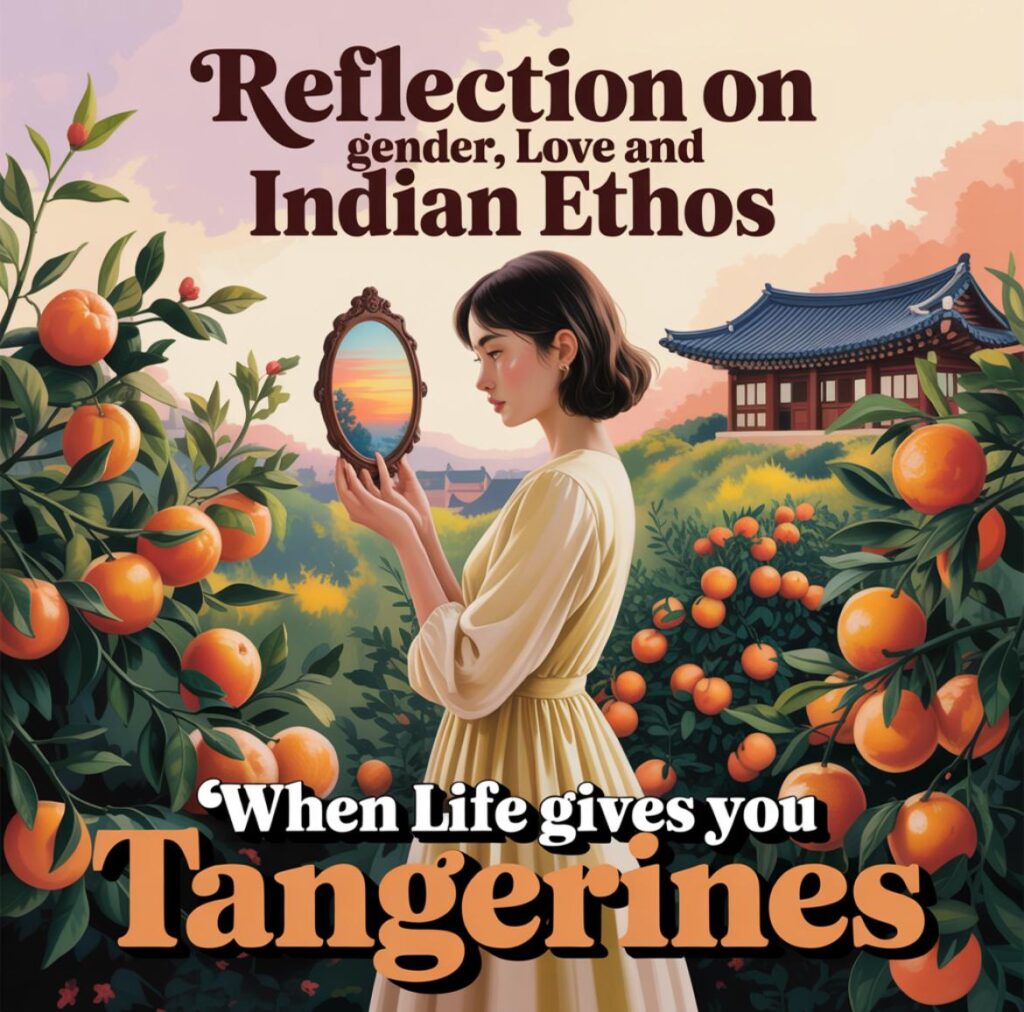
In the amber-hued twilight of Jeju Island, where tangerine groves stretch endlessly toward the sea, a story unfolds that transcends borders, languages, and time itself. When Life Gives You Tangerines isn’t merely a K-drama; it’s a mirror reflecting the deepest truths about love, resilience, and the quiet heroism that exists within ordinary families—truths that resonate particularly powerfully as we approach Father’s Day, a celebration of paternal love that comes in many forms.
The Quiet Revolution of Positive Role Modeling
Like the slow ripening of tangerines under the Korean sun, this Netflix masterpiece—which has achieved the highest rating ever recorded for Korean content on IMDb at 9.4, with its final episode receiving 9.8—offers something revolutionary in its gentleness. In an era where masculinity is often defined by dominance and volume, Gwan-sik (Park Bo-gum) presents us with a different archetype entirely: the man who chooses love over control, partnership over patriarchy.
Here lies the profound Father’s Day connection that transforms this series from entertainment into enlightenment. Gwan-sik isn’t just Ae-sun’s devoted partner; he evolves into a father figure who challenges every stereotype we’ve inherited about what it means to be a man, a husband, a father. In a time when patriarchal family and societal structures allowed men power over their wives and daughters, Gwan-sik chose to love Ae-sun rather than to control her. This choice reverberates through decades, creating ripples that touch every subsequent generation.
Gender Through the Lens of Time
The genius of When Life Gives You Tangerines lies in its unflinching examination of gender dynamics across six decades of Korean history. Ae-sun’s world is one where girls from poor families cannot be class presidents despite fairly winning the majority vote. At home, she is made to do housework and seldom gets the good fish; living with her uncle’s family means everything goes to her cousin, the boy of the house.
Yet what makes this narrative extraordinary—and what speaks so directly to contemporary Indian audiences—is how it refuses to present these inequalities as insurmountable. Instead, it shows us the slow, determined erosion of these barriers through individual acts of love and courage. Ae-sun’s mother, a haenyeo (female deep-sea diver) who risks her life daily to harvest seafood, embodies the fierce maternal determination that wants her daughter to be well-educated, take a different path, and rid herself of the abject poverty they live in.
The series becomes a testament to positive role modeling for both boys and girls. For young women, Ae-sun represents the girl who dreams of becoming a poet despite poverty, who refuses to accept “it is better to be a cow than a woman in Jeju.” For young men, Gwan-sik offers a blueprint for masculinity that is both strong and tender, protective yet empowering.
The Indian Mirror: Cultural Resonance Across Borders
Watching When Life Gives You Tangerines feels remarkably familiar to Indian audiences, not because the specifics mirror our experience, but because the emotional architecture is identical. The multigenerational family dynamics, the weight of societal expectations on women, the economic struggles that shape life choices, the importance of community in individual identity—all these elements create an uncanny sense of recognition.
The series captures what social anthropologists call “affective kinship”—the way familial love transcends biological connections. Just as in Indian joint families, where relationships are complex webs of obligation, love, conflict, and support, the Jeju Island community in the drama functions as an extended family where everyone’s business becomes everyone’s concern.
The show’s exploration of women’s agency within patriarchal structures feels particularly relevant to Indian society. Director Kim Won-seok described it as “a tribute to the generations of grandmothers, grandfathers, fathers and mothers who have lived fiercely, and a song of encouragement for the daughters and sons who will navigate the world ahead”. This sentiment could easily apply to the Indian experience, where each generation of women has fought for slightly more freedom, slightly more choice, slightly more voice.
The Numbers Tell a Story of Global Hearts
The series’ phenomenal success speaks to its universal appeal. Within just three days of its release, ‘When Life Gives You Tangerines’ recorded 3.6 million views (13.9 million watch hours), securing the No. 4 spot in the global non-English TV show category, ranking in the TOP 10 lists across 24 countries. According to a survey conducted by Gallup Korea, ‘When Life Gives You Tangerines’ emerged as the most loved program, earning 6.9% of the votes.
But perhaps more telling than viewership numbers is the emotional response. The show has a near-perfect 98% audience score on Rotten Tomatoes, suggesting that audiences aren’t just watching—they’re connecting, feeling, and finding pieces of themselves in this Jeju Island story.
Indian Narratives: The Similar Soil
While India doesn’t have a direct equivalent to When Life Gives You Tangerines, our web series landscape offers fascinating parallels. Series like Gullak, which offers a humorous look into the everyday life of a middle-class Indian family, and Panchayat, which captures rural Indian community dynamics, share DNA with the Korean masterpiece.
Four More Shots Please! explores urban women’s experiences in contemporary India, while family sagas like Yeh Meri Family capture the nostalgic warmth of childhood within extended family structures. Yet none quite achieve what When Life Gives You Tangerines accomplishes—the seamless weaving of individual love stories into the larger tapestry of historical and social change.
What Indian content often lacks is the series’ particular gift for showing character growth across decades. Our narratives tend to focus on specific life phases rather than the full arc of human experience. There’s space in Indian storytelling for more multigenerational sagas that trace how personal choices ripple through time, how individual acts of courage can reshape family destinies.
Father’s Day Reflections: Redefining Paternal Love
As Father’s Day approaches, When Life Gives You Tangerines offers a profound meditation on what paternal love actually means. Gwan-sik’s devotion to Ae-sun and their children isn’t expressed through traditional displays of authority or provision alone. Instead, his fatherhood is characterized by presence, support, and the radical act of seeing his partner as an equal.
The series suggests that the most revolutionary thing a father can do is raise children who understand that love is a choice made daily, not a feeling that simply exists. Gwan-sik models for his children—and for viewers—that masculinity can be gentle without being weak, that strength can manifest as emotional availability rather than emotional distance.
This representation becomes particularly powerful in the Indian context, where Father’s Day often celebrates the traditional patriarch. When Life Gives You Tangerines invites us to expand our definition, to honor the fathers who cook when mothers are tired, who encourage daughters’ ambitions without condition, who show sons that vulnerability is strength.
The Lasting Sweetness
The original Korean title, 폭싹 속았수다, is a common phrase in the Jeju dialect that translates to “you have worked hard” or “thank you for your hard work”. This acknowledgment—of effort, of struggle, of the daily choice to keep loving—becomes the series’ ultimate gift.
In our achievement-obsessed culture, both in India and globally, When Life Gives You Tangerines reminds us that the most profound success might simply be enduring love. The series doesn’t promise that life will be easy, that gender equality will arrive overnight, or that economic struggles will disappear. Instead, it offers something more valuable: the assurance that love, consciously chosen and daily renewed, can transform even the most difficult circumstances into something beautiful.
As we celebrate Father’s Day, perhaps the greatest gift we can give—or request—is the model Gwan-sik provides: a love that listens, supports, and never demands that the beloved become smaller to make space for our own ego. In a world that often confuses possession with protection, When Life Gives You Tangerines reminds us that the sweetest love is the one that helps the other person become fully themselves.
The tangerines of Jeju Island ripen slowly, touched by salt air and mountain breezes, growing sweet through seasons of sun and storm. Like love itself, they cannot be rushed. And when they’re finally ready, they offer sweetness that makes every moment of patience worthwhile.
In this way, When Life Gives You Tangerines becomes more than entertainment—it becomes instruction manual for the heart, teaching us that the most radical act might simply be loving someone completely, supporting their dreams unconditionally, and choosing partnership over power, every single day
Opposite her, Park Bo Gum’s Gwan-sik emerges as the quintessential green flag in a relationship, a man whose steadfast devotion manifests not through grand gestures but through consistent acts of care and sacrifice. He puts her shoes on, sells her cabbages at the market and stands as an unwavering presence through life’s harshest seasons.
Their chemistry transcends typical romantic tropes. Where other dramas might rely on declarations of love or dramatic confessions, When Life Gives You Tangerines finds its emotional resonance in the spaces between words – a lingering glance, a protective gesture, the quiet way Gwan-sik makes room for Ae-sun’s dreams even when circumstances conspire against them.
When their long-awaited first kiss finally arrives against a backdrop of golden canola fields, it carries the weight of years of unspoken longing.
Director Kim Won-seok (previously acclaimed for Signal and My Mister) demonstrates masterful restraint, allowing scenes to breathe and emotions to simmer. The cinematography captures Jeju Island’s rugged beauty with a painterly eye – from the bobbing helmets of haenyeo divers resembling constellations in the sea to the radiant glow of twilight conversations that change the course of lives.
Each frame feels meticulously composed, transforming even ordinary domestic moments into visual poetry.
The English title, “When Life Gives You Tangerines, cleverly adapts the familiar “when life gives you lemons” adage, substituting tangerines as a nod to Jeju’s famous crop (the island produces nearly all of South Korea’s tangerines).
This metaphor of making something sweet from life’s bitter circumstances runs throughout the narrative. However, the original Korean title, roughly translated as “you have worked hard” or “thank you for your hard work” in Jeju dialect, carries even deeper significance, acknowledging the labour – physical and emotional – that sustains relationships across decades.
As the narrative progresses, the series expands its focus to include the next generation, particularly Ae-sun and Gwan-sik’s daughter, Geum-myeong. Her journey provides a counterpoint to her parents’ lives, illustrating both how much has changed in Korean society and what remains immutable about human relationships.
The show thoughtfully subverts the “one true love” trope through her romantic path, suggesting that compatibility and mutual respect ultimately matter more than first love’s intoxicating rush.
While the pacing may challenge viewers accustomed to more plot-driven narratives, patience is rewarded with profound emotional payoffs. When Life Gives You Tangerines defies easy categorization – it’s not strictly a romance, a historical drama, or a family saga, but rather a meditation on time’s passage and love’s ability to endure through changing circumstances.
Moon So-ri and Park Hae-joon, who portray Ae-sun and Gwan-sik in their later years, seamlessly continue the emotional journey established by their younger counterparts. The transition between different actors playing the same characters across time periods feels organic rather than disruptive.
In its final moments, as an aged Ae-sun reflects on her life’s journey, the series delivers its most poignant truth: that aging changes only our outward appearance while our inner selves remain constant – still capable of joy, sorrow and profound connection. Like the tangerines that give the series its English name, When Life Gives You Tangerines offers an experience both sweet and tart, a reminder that life’s most meaningful moments often arrive without fanfare, nestled within the quiet rhythms of ordinary days.
For viewers seeking a K-drama experience beyond the high-concept premises of global hits like Squid Game or All of Us Are Dead, When Life Gives You Tangerines offers a more intimate but equally compelling alternative. It’s a series that understands that everyday struggles often demand more courage than extraordinary circumstances, and that choosing to remain by someone’s side day after day constitutes its own kind of heroism.

